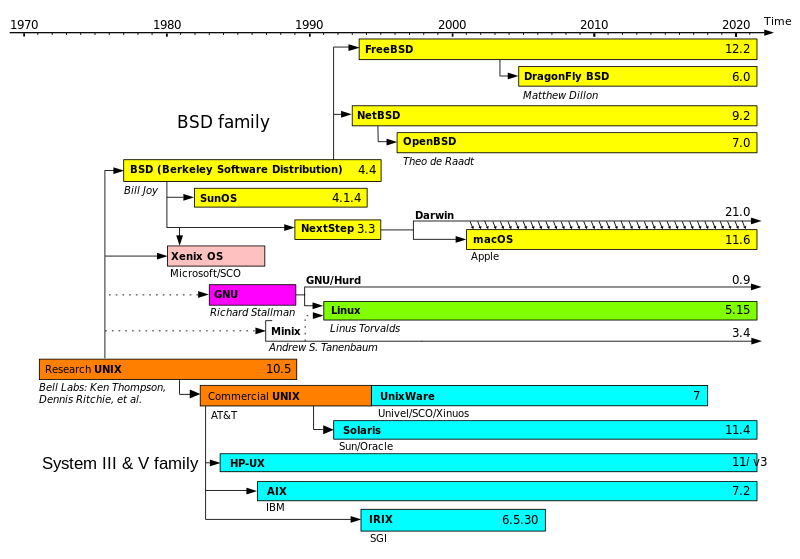This is a preview of things to come in Serenum Release 5. A new update for my OS that I am relentlessly crunching on to complete.https://samhsmith.com/serenum/
Not my video. Just felt it fits here for more discussion. Personally I do like the idea of more/better sandboxing for apps.
On August 10, 2007, a federal district court judge in SCO v. Novell ruled on summary judgment that Novell, not the SCO Group, was the rightful owner of the copyrights covering the Unix operating system. […] After the ruling, Novell announced they had no interest in suing people over Unix and stated “We don’t believe there is Unix in Linux”
Linux (/ˈlɪnʊks/ LIN-uuks)[11] is a family of open-source Unix-like operating systems based on the Linux kernel,[12] an operating system kernel first released on September 17, 1991, by Linus Torvalds.
A Linux-based system is a modular Unix-like operating system, deriving much of its basic design from principles established in Unix during the 1970s and 1980s.
What difference are between “*-based” and “*-like”? If the meaning are the same then I’m right, if Unix-based means must be like a fork directly from Unix and not just a copy build from 0, then yeah, you are right. And I think based and like are the same meaning.
I just asked to ChatGPT and seems the AI can explain this:
“Unix-like” and “Unix-based” are terms used in the realm of operating systems, particularly in relation to the Unix operating system and its derivatives. While they may seem similar, they convey slightly different concepts:
Unix-like:
- “Unix-like” refers to operating systems that resemble Unix in terms of design, behavior, or functionality, but may not necessarily be directly derived from the original Unix codebase.
- These operating systems typically adhere to Unix-like principles and may incorporate similar features, commands, and programming interfaces.
- Examples of Unix-like operating systems include Linux, FreeBSD, OpenBSD, and macOS (which is based on a Unix-like kernel called Darwin).
Unix-based:
- “Unix-based” specifically indicates operating systems that have a direct lineage or heritage tracing back to the original Unix operating system developed at Bell Labs in the 1970s.
- These operating systems often have their roots in the Unix codebase, either through direct licensing agreements, re-implementations, or forks of the original Unix source code.
- Examples of Unix-based operating systems include various commercial Unix variants such as Solaris, AIX, and HP-UX, which have historical ties to the original Unix.
In essence, while both terms relate to systems that share similarities with Unix, “Unix-like” suggests a broader category of Unix-inspired operating systems, while “Unix-based” specifically denotes those with a direct lineage or relationship to the original Unix system.
So you are right, and they probably wanted to mean Unix-like. But we could still say based as both has some kind of relationship, and that’s why Linux it’s on Unix timeline from wiki.
From your reading, the missing clarification you are looking for is “POSIX”. Most people don’t know what POSIX is, that’s why it reads “Unix-Like” for general audiences. If Unix didn’t exist another synonym would supplement.
Back to my original point – the OP, a layman, probably in good faith and though a honest misunderstanding, repeated a false claim that was resolved in a International 10+ year lawsuit in 2007.
It’s literally mal-information. But hey in sure your elders think that a Xbox, PS5 and Computer are all “Nintendo’s or whatever”.
He says it’s based, not that is Unix.
It’s not Unix-based either.
https://en.m.wikipedia.org/wiki/SCO–Linux_disputes
https://en.m.wikipedia.org/wiki/Linux
But on the same links you sent are saying:
What difference are between “*-based” and “*-like”? If the meaning are the same then I’m right, if Unix-based means must be like a fork directly from Unix and not just a copy build from 0, then yeah, you are right. And I think based and like are the same meaning.
Edit:
I also found this image: https://en.m.wikipedia.org/wiki/File:Unix_timeline.en.svg
Unix timeline:
Edit 2:
I just asked to ChatGPT and seems the AI can explain this:
So you are right, and they probably wanted to mean Unix-like. But we could still say based as both has some kind of relationship, and that’s why Linux it’s on Unix timeline from wiki.
So far my claims are:
Linux is not Unix
Linux is not “based” on Unix
I’ve proven both claims using respected sources.
From your reading, the missing clarification you are looking for is “POSIX”. Most people don’t know what POSIX is, that’s why it reads “Unix-Like” for general audiences. If Unix didn’t exist another synonym would supplement.
Back to my original point – the OP, a layman, probably in good faith and though a honest misunderstanding, repeated a false claim that was resolved in a International 10+ year lawsuit in 2007.
It’s literally mal-information. But hey in sure your elders think that a Xbox, PS5 and Computer are all “Nintendo’s or whatever”.